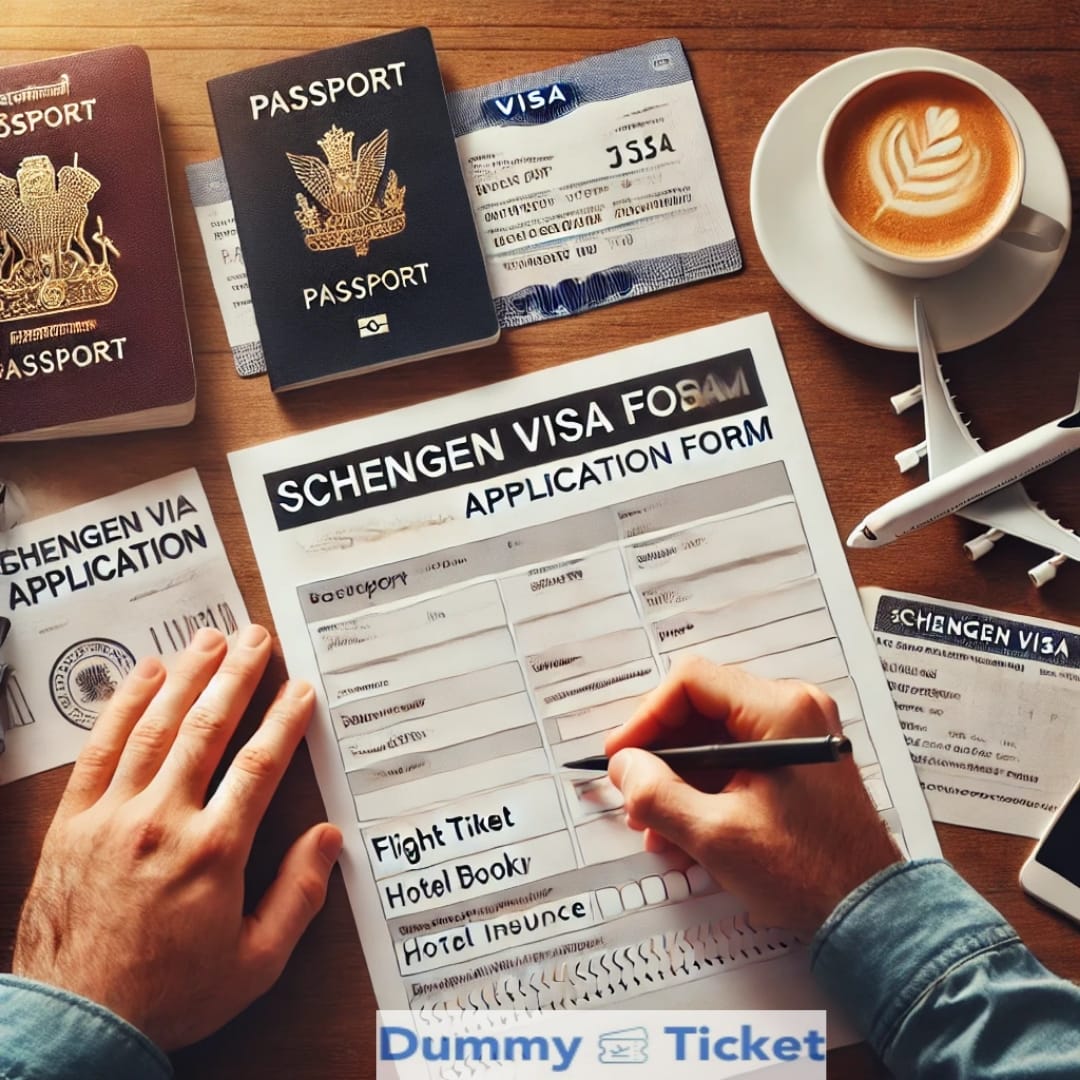Traveling to Europe is a dream for many individuals around the world, whether for tourism, work, study, or treatment purposes. In order to achieve this dream, the Schengen visa is considered the main key that allows travel to the countries of the Schengen area, which includes 27 European countries, including Germany. In this article, we will discuss in detail the steps and requirements for obtaining a Schengen visa, with a focus on the German entry visa, and provide important tips that will help you avoid common obstacles and ensure that you obtain the visa easily.
Steps to obtain a Schengen visa:
1. Determine the Type of Visa: The Schengen visa comes in various types (tourist, business, study, medical, etc.). Choose the type that suits your trip.
2. Identify the Main Country: If you are visiting several countries within the Schengen Area, you may need to apply for a visa from the country where you will spend the most time.
3. Book an Appointment at the Embassy or Consulate: Each Schengen country has a system for scheduling visa application appointments, which you can do online or by directly contacting the embassy.
4. Prepare the Required Documents:
A passport valid for at least 3 months after the end of the trip.
A completed and signed visa application form.
Recent personal photos that meet visa requirements.
Travel health insurance covering at least €30,000.
Temporary flight reservation.
Proof of accommodation (hotel reservation or invitation from a resident).
Proof of income (bank statement or employment certificate).
5. Submit the Application: Visit the embassy or consulate at your scheduled appointment, and you may be required to attend a personal interview.
6. Pay the Fees: Visa fees vary by country and age category, typically around €80 for adults.
7. Wait for a Decision: Visa processing usually takes about 15 to 30 days. Be sure to track the status of your application.
8. Receive the Visa: If approved, the visa will be stamped in your passport.
The Importance and Benefits of a Schengen Visa
The Schengen visa is one of the most well-known visas globally, allowing its holder to enter and move freely between member countries in the Schengen Area without needing multiple visas. Below are some of the key benefits of obtaining a Schengen visa:
1. Ease of Travel: The Schengen visa allows you to travel between 27 European countries without needing additional visas, making it easier to plan trips that include multiple countries at once.
2. Business Facilitation: If you're conducting business in Europe, the Schengen visa allows you to attend meetings, events, and conferences easily.
3. Study and Medical Treatment: The Schengen visa is also granted to individuals who require short periods of study or medical treatment in Europe.
4. Saving Time, Money, and Effort: Instead of issuing multiple visas for each country, a Schengen visa allows entry into several countries, reducing costs and complications.
Who Needs a Schengen Visa to Enter Germany?
Visa entry requirements for Germany vary depending on the nationality of the individual. Below are the details:
EU Citizens: Citizens of European Union countries do not need a visa to enter Germany, as they enjoy free movement within the EU.
Non-EU Citizens: Generally, foreigners who are not from EU countries are required to obtain a visa for stays in Germany. However, there are some exceptions. Nationals of certain countries do not need a visa for short visits (up to 90 days within 180 days).
To get a list of these countries, you can visit the European Union website or consult the German embassy.
Authorities Responsible for Issuing Schengen Visas in Saudi Arabia
In Saudi Arabia, the Embassy of the Federal Republic of Germany is responsible for issuing entry visas for trips where Germany is the sole or primary destination. If you plan to visit several countries within the Schengen area, the primary destination (the country where you spend the most time) is responsible for issuing the visa.
Steps to Apply for a Schengen Visa for Germany
- Preparing the Application
Before submitting your application, ensure that all required documents are prepared. Below are the key documents you'll need:
- Passport: Must be valid for at least 3 months after your planned stay in the Schengen area.
- Visa Application Form: You can fill out the visa application form electronically through the German VIDEX system, which helps streamline and speed up the processing.
- Passport Photos: Submit recent passport photos that meet visa standards.
- Travel Health Insurance:
- The travel health insurance must cover expenses of at least €30,000.
- Proof of Accommodation: Such as a hotel reservation or an invitation letter from a host in Germany.
- Flight Ticket: A round-trip flight reservation must be submitted.
- Financial Proof: Evidence of your ability to cover the costs of your stay, such as a recent bank statement or a letter from your employer.
- Booking an Appointment
You can book an appointment to submit your visa application up to 6 months before your travel date. Appointments are booked through visa service centers like VFS Global in Riyadh, Jeddah, or Khobar. At these centers, you can submit all required documents, pay the visa fees, and provide biometric data (fingerprints), if they haven't been collected in the past five years. - Submitting the Application at the Service Center
When attending the appointment, bring all the required documents to the chosen service center. Service centers like VFS Global will check the application’s completeness, collect the visa fee, and send it to the German embassy for processing. It’s important to note that these service centers do not influence the embassy’s final decision on your visa application. - Awaiting the Decision and Receiving Your Passport
Processing visa applications usually takes 15 to 30 days. Once a decision is made, you can collect your passport from the service center or opt to have it mailed to you. If your visa is approved, your passport will contain the visa stamp allowing you to enter the Schengen Area.
Important Tips for Successfully Obtaining a Schengen Visa
- Apply Early
Avoid last-minute applications. It is advisable to apply 6 months before your planned travel date, especially during peak periods like summer and holidays, as visa processing may take longer. - Ensure Accuracy and Correctness of Documents
It's crucial to check all the paperwork and information carefully before submitting. Any mistake in the documents or submission of inaccurate information could lead to a visa rejection. Ensure all documents are consistent with the information in the application form. - Get the Right Travel Insurance
Travel health insurance is a fundamental requirement for obtaining a Schengen visa. Make sure your insurance policy covers all visa requirements, including medical coverage up to €30,000 and repatriation in emergencies. - Book Preliminary Tickets and Hotels
Sometimes the German embassy may require proof that you've booked a return flight and accommodation. You can make preliminary bookings without full payment to avoid losing money if the visa is rejected. - Be Honest During the Interview
If you're required to attend an interview at the embassy, be honest and provide accurate details about the purpose of your visit and your plans during your stay in Germany. - Submit a Complete Application
It’s essential to submit a complete application by ensuring all required documents are provided based on the type of visa you're applying for. Missing documents may result in delays or rejection of the application. For accurate information on the required documents, refer to the German embassy’s website or contact the visa application center. - Ensure Sufficient Financial Resources
One of the essential requirements for obtaining a Schengen visa is proving you have enough financial means to cover the costs of your stay. Therefore, ensure that your bank account has a stable balance for the last three months to support your application. - Clearly Define the Purpose of Travel
When applying for a visa, the purpose of travel must be clear and consistent with the type of visa you're applying for (whether for tourism, business, study, family visit, etc.). The embassy may ask for additional documents to support your travel purpose, such as an invitation letter from a company or a friend or family member. Make sure to submit these when needed. - Follow Up on Your Application Status
After submitting your application and paying the fees, you can track the status of your application online through the visa application center’s website. If additional documents or interviews are required, follow the instructions and coordinate with the embassy in a timely manner. - Adhere to Travel Dates
Stick to the dates specified in your visa application, as any changes may require resubmitting a new application or updating the existing one. Ensure your flight and hotel bookings align with the dates provided in the visa application.
Visa Processing Time and Renewal
Processing a Schengen visa for Germany typically takes 15 to 30 days. The time may vary depending on the volume of applications received by the embassy, the time of year, and the individual case. It's recommended to apply early to avoid unexpected delays.
Renewing a Schengen Visa
If you need to extend your Schengen visa while in Germany, it’s possible to apply for an extension if there are valid reasons, such as medical emergencies or flight delays. However, extensions are only granted in exceptional cases, and you must provide strong justifications for your request.
What to Do If Your Visa Application Is Rejected
Sometimes visa applications may be rejected for various reasons, such as incomplete documents, insufficient financial resources, or providing inaccurate information. If your visa is rejected, don't worry. You can follow these steps:
1. Request an Explanation
The reason for the visa rejection is usually stated in the rejection letter from the embassy. Review the possible reasons and try to understand what led to the decision.
2. File an Appeal
If you believe the rejection was unjustified, you can file an appeal. The appeal process varies by country, but you must submit the appeal within a specific period after receiving the rejection. You may need to provide additional documents or make corrections to your original application.
3. Submit a New Application
If you don’t wish to appeal or if the appeal fails, you can submit a new application after reviewing and updating the required documents and correcting previous mistakes. It's preferable to wait for some time before reapplying to ensure that the issues that caused the rejection are addressed.
Types of Schengen Visas You Can Apply For
1. Tourist Schengen Visa
This is the most common type of visa, intended for individuals who plan to visit Germany for tourism purposes only. This visa requires proof of hotel reservations, tentative flight bookings, and a clear travel itinerary.
2. Business Schengen Visa
A business visa is granted to individuals who need to travel to Germany for business meetings, conferences, or other commercial activities. Obtaining this visa requires an invitation letter from a German company and a clear business plan.
3. Family or Friend Visit Schengen Visa
If you wish to visit a relative or friend living in Germany, you can apply for a Schengen visa for family or friend visits. This visa requires an invitation letter from the person you will be staying with, along with details of accommodation and travel plans.
4. Short-Term Study Schengen Visa
This visa is for individuals who wish to attend short-term training or study programs in Germany. It requires proof of enrollment in the study program and details of accommodation during the study period.
5. Medical Schengen Visa
This visa is granted to individuals who require medical treatment in Germany. Medical reports outlining the need for treatment in Germany, as well as hospital reservations and details of the required treatment
Health Insurance: A Basic Requirement for Obtaining a Schengen Visa
Travel health insurance is one of the main requirements for obtaining a Schengen visa. This insurance must cover any potential medical expenses that may arise during your trip to Germany, including accidents and emergency illnesses. The insurance must meet the minimum coverage requirement of €30,000 and be valid in all Schengen area countries.
Health insurance can be obtained from internationally recognized insurance companies. It is recommended to review the policy carefully to ensure it covers all the medical needs that may arise during your trip, including the cost of returning home in case of emergencies.
What Happens After Obtaining a Schengen Visa:
Important Travel Tips
After receiving your Schengen visa for Germany, there are some important tips to follow to ensure a smooth and comfortable trip:
1. Check the Validity of the Visa Before traveling, make sure to review the visa's validity period and the number of allowed entries. Some visas are valid for a single entry only, while others allow multiple entries. Ensure that the permitted stay period aligns with your travel plans.
2. Keep Copies of Important Documents Make copies of all important documents, such as your passport, visa, health insurance, and travel bookings. Keep these copies in a safe place in case the original documents are lost.
3. Comply with Residency Laws When entering the Schengen area, you must adhere to local laws and the permitted length of stay. Overstaying beyond the allowed period could lead to legal issues and may negatively affect your chances of obtaining future visas.
4. Contact the Embassy in Case of Emergencies If you encounter any issues during your trip (such as losing your passport or facing an emergency), contact the local embassy or consulate for assistance. Embassies and consulates typically provide help to citizens abroad in such situations.
Schengen visa for travel to Germany is a key step toward realizing your dream of visiting Europe, whether for tourism, business, study, or medical purposes. By carefully following the required steps, preparing the documents accurately, and submitting your application in a timely manner, you can increase your chances of obtaining the visa smoothly and without complications.
Advance planning and adhering to the embassy’s requirements are essential to securing the visa. By following the tips provided in this article, you can prepare a professional visa application that meets all necessary conditions.
The importance and necessity of booking a Dummy flight Ticket for a Schengen visa
Dummy flight Ticket is one of the basic steps to obtain a Schengen visa. Most embassies and consulates include proof of temporary flight reservations as part of the list of required documents. This reservation is not only proof that you are serious about travel, but it also shows your commitment to the submitted plan for the trip.
Dummy flight Ticket offers many advantages, including reducing the financial risks associated with booking non-refundable tickets in the event of a visa refusal. Also, embassies do not require a fully paid flight ticket. Rather, they are satisfied with a confirmed reservation containing the flight path and expected dates.
On the other hand, this reservation is necessary to ensure a logical and acceptable planning of your trip. For example, your application may be denied if your travel dates are inconsistent or if you do not demonstrate your ability to return on time.




